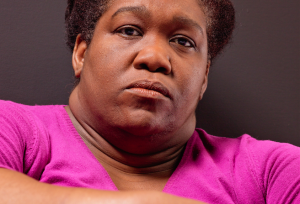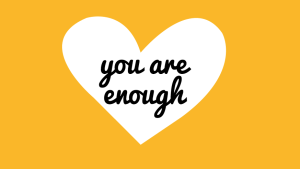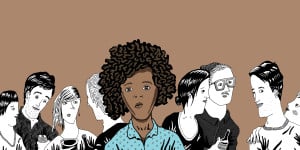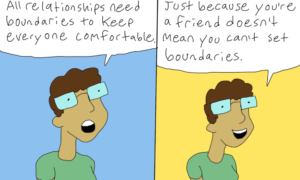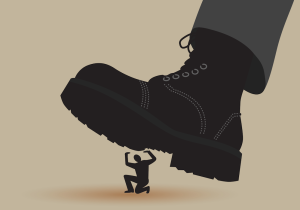Originally published on Adios Barbie and republished here with their permission.
We’re told not to judge a book by its cover, but then moments later hear about the importance of first impressions.
Certain things about our appearance are easier to control than others. You can easily get a new haircut or start wearing a more professional wardrobe, but other things are less easy to control, like a pronounced birthmark or your weight.
It’s frowned upon to make fun of someone for having a birthmark, but weight gain or loss is commonly pointed out — both as a compliment and a criticism.
Whether we like it or not, weight affects the way people view one another.
Three years ago, Glamour magazine asked Yale’s Rudd Center for Food Policy and Obesity to conduct research on perceptions of overweight and underweight individuals. The study received a significant amount of press coverage and demonstrated that overweight women were more likely to be perceived as slow, undisciplined, sloppy, or lazy.
Additional research has shown that weight discrimination has a tangible effect on people’s lives.
Here are six of the scariest ways we discriminate against overweight people.
1. Lack of Medical Services
Research conducted at Wake Forest School of Medicine demonstrated that many medical students have an unconscious bias against overweight patients.
Theory suggests that doctors assume obese patients will disregard medical advice, like they seemingly have with the recommendation to eat healthily and exercise (even though it’s impossible to tell a patient’s eating habits or physical activity from their body type).
The lack of consideration in these situations can lead to poor care and further health problems.
Similarly, doctors surveyed agreed they should be allowed to deny non-emergency treatments to individuals who need to lose weight or stop smoking.
2. Increased Likelihood of Conviction
Another study showed that when shown photos of thin men and women versus overweight men and women, male jurors were more likely to view the overweight women as guilty based on a Likert scale rating.
This means that if a lean woman and an overweight woman were on trial for the same crime, the jury would be more likely to convict the larger woman.
So much for innocent until proven guilty; more like innocent until seen as heavy.
3. Lack of Legal Rights
While these varied examples of discrimination exist, there are currently no ways to protect people whose rights are being infringed upon because of their weight.
A person can be fired or terminated based on their weight, even if they do their job well.
Although organizations are working to help fight this legal discrimination, there is currently no legislation that can protect against this kind of mistreatment.
4. Impacted Earning Potential
Discrimination against heavier women also exists in the workplace.
Overweight people, regardless of gender, are earning $1.50 per hour less than their thinner counterparts.
Women specifically are also less likely to advance in their careers because of their weight.
One study suggests that approximately 50% of male CEOs are overweight, but only 5–22% of female CEOs had a BMI of over 30.
While BMI may not be the most legitimate measure of health, this figure does go to show the extensive difference between how men and women who are considered overweight are promoted – or not.
5. Ongoing Bullying
The effects of bullying have received widespread attention in the news and media. Children are likely to make fun of their peers because of their weight, but fat-shaming is widely acceptable among adults as well.
Somewhere along the way, it’s become common practice to turn heavier people into the butt of jokes.
Actor Kevin James made a career out of laughing at himself for being overweight on shows like King of Queens and movies like Paul Blart: Mall Cop.
A recent film called The Duff was released that portrayed the struggle many women face when they’re considered the “DUFF” (designated ugly fat friend). While the cruel term might not be socially acceptable, it’s certainly used frequently and without shame to alienate heavier women.
As with anything in the media, this is a serious cause for concern, because it has an impact on the way many people view themselves and others.
The movie may be funny, but the issue certainly is not, and we should not dismiss it as “just a joke.”
6. Familial Discontent
Perhaps the most disturbing of all these types of discrimination is the one that exists within a family.
When looking at parents’ willingness to help a child fund a new car, research determined that parents were less likely to provide for a child who is overweight. Ideally, we imagine that parents would love their children unequivocally, which makes these findings more unsettling.
A child’s home life is the basis on which they build their self-esteem, and the negative consequences of an unhealthy familial bias are far-reaching and quite dangerous to a child’s health.
I had a best friend growing up whose mother was constantly putting her down for her weight, and she ended up having a really unhealthy relationship with food – and with her mother. With discrimination coming from all other angles – peers, teachers, and future employers – this bias within the family has got to go.
***
It’s true that weight affects how we’re perceived, and how we perceive other people. The first step toward fixing any problem is admitting that it exists. We can only hope that bringing more attention to this issue will prompt the appropriate changes.
In the meantime, continue to own your own body and refuse to perpetuate – or accept – any of these forms of discrimination. Discrimination is discrimination, based on size or anything else, and we don’t have to sit back and take it.
Sarah Landrum is a freelance writer and blogger sharing advice on living a happy and healthy life. She is also the founder of Punched Clocks, a career development site dedicated to inspiring happy and successful careers. Follow her on Twitter @SarahLandrum, Google+, and LinkedIn.
Search our 3000+ articles!
Read our articles about:
Our online racial justice training
Used by hundreds of universities, non-profits, and businesses.
Click to learn more


